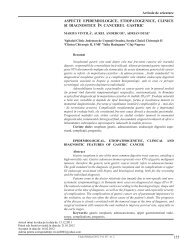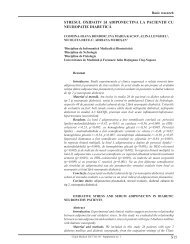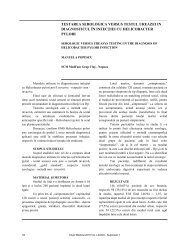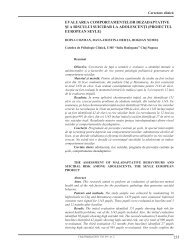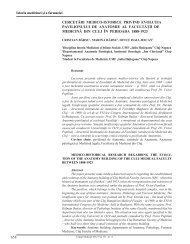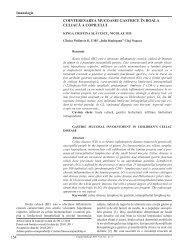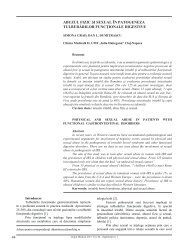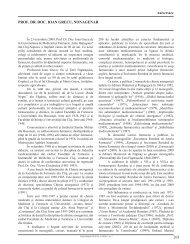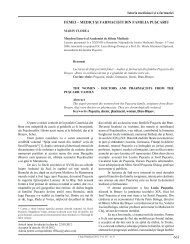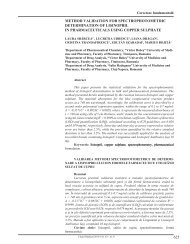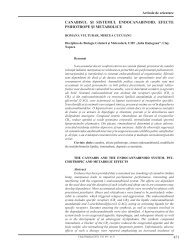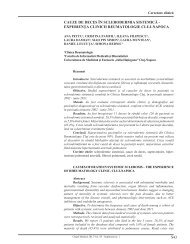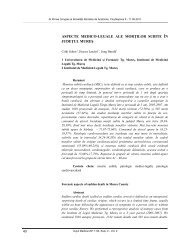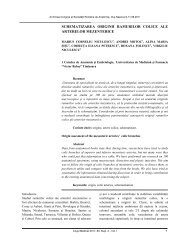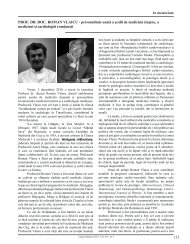Create successful ePaper yourself
Turn your PDF publications into a flip-book with our unique Google optimized e-Paper software.
Cercetare clinică<br />
EARLY COURSE OF COGNITIVE DYSFUNCTIONS<br />
DURING ALCOHOL CESSATION IN CHRONIC<br />
ALCOHOLIC PATIENTS<br />
IOANA CRĂCIUN 2 , IOANA MICLUŢIA 1 , RODICA MACREA 1 ,<br />
CODRUŢA POPESCU 2<br />
1 University of Medicine & Pharmacy Cluj-Napoca, Department of Psychiatry<br />
2 Second Psychiatric Clinic Cluj-Napoca<br />
Background<br />
It is well known that chronic alcoholism affects cognitive functions and<br />
various hypotheses about the brain areas involved have been advanced. Many authors<br />
agree upon the specificity of the cognitive function related the frontal lobe call them<br />
“executive functions” (1, 2).<br />
Heavy alcohol consumption is associated with global neurophysiological<br />
change, including cortical atrophy, hypometabolic activity, reduced cerebral blood flow<br />
and altered neurotransmitter activity (reduced glutamate and enhanced GABA) (3).<br />
Although changes are diffuse, the prefrontal and temporal regions appear especially<br />
impacted (4). Acute effects of moderate drinking include impaired immediate learning<br />
and subsequent retrieval of information learned while intoxicated. On occasion, acute<br />
heavy consumption produce blackout (5). Alcohol abuse is associated with a clear and<br />
consistent pattern of general cognitive deficits, which resolved to some extent with<br />
protracted abstinence. Frequent consumption of large quantities of alcohol rather then<br />
lifetime consumption poses the highest risk for cognitive deficits (6).<br />
Objective<br />
1. Assessment of cognitive functions (verbal memory, concentration,<br />
psychomotor speed and executive functions) after 10 days for date of last<br />
alcohol use.<br />
2. Level’s course of cognitive functions after 6 weeks of abstinence.<br />
Material and Methods<br />
Thirty-two patients (13 males and 19 females) with Alcohol Dependence and<br />
thirty healthy control subjects participated in the study. Patients were diagnosed<br />
according to the ICD-10 and DSM-IV-TR criteria. Patients were recruited from Second<br />
Psychiatric Clinic – Cluj Napoca. A clinical semi structured interview was used to<br />
obtain the participant’s age, years of education, medical history, duration and date of<br />
last of alcohol use. The Michigan Alcoholism Screening Test (MAST) was<br />
administrated. Exclusion criteria for all subjects was psychiatrically (other then alcohol<br />
use disorder – for patients), neurological and medical diseases that could affect<br />
cognitive functioning. The two groups were matched for age, sex, and number of years<br />
of education. Patients had an average of years of education by 11,4 and an average of<br />
years of alcohol abuse by 15,06.<br />
47



